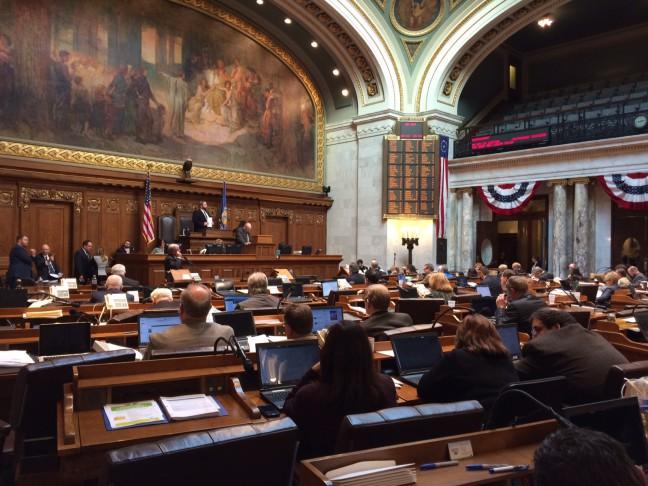A number of bipartisan bills passed through the Assembly Tuesday including bills to protect victims of sexual assault, wrongly convicted criminals and domestic violence victims. A controversial lake dredging bill also passed.
Exemption from underage drinking for sexual assault victims
With a unanimous bipartisan voice vote, the Assembly passed a bill that would exempt victims of sexual assault and helping bystanders from underage drinking tickets.
Rep. Joan Ballweg, R-Markesan, said prior to the Assembly session it is more important to bring justice to cases of sexual assault than give out underage drinking citations.
“We want the perpetrator of sexual assault to be … prosecuted in this particular case,” Ballweg said. “The actual issue of sexual assault is far more serious than that underage drinking.”
To qualify as a bystander, an individual would have to be actively helping the victim and cooperating with both law enforcement and health professionals.
The legislation aims to increase reporting of sexual assaults to combat sexual violence more effectively, Ballweg said in a statement.
“We know that there is a correlation between sexual assault and consuming alcohol, and is a problem on our college campuses,” Ballweg said. “This bill will help fight the prevalence of this crime.”
The bill is expected to have a public hearing in the Senate next week.
Increased benefits for wrongfully convicted
Another bill that would increase money given to those wrongfully convicted of crimes passed unanimously 98-0.
Rep. Dale Kooyenga, R-Brookfield, said the bill would never be able to fully restore justice for those who were wrongly incarcerated, but that it makes strides in the right direction.
“This bill does not provide justice,” Kooyenga said. “It cannot provide justice for people who have been put in the spotlight for murder and rape and abuse of children, but we can provide them [with] an opportunity to start where they left off.”
Wisconsin currently has the lowest compensation levels in the entire nation for the wrongly incarcerated, Rep. Gary Hebl, D-Sun Prairie, said in the Assembly session. Those exonerated receive fewer resources than guilty offenders who serve their full sentences, he added.
The bill would increase monetary compensation from the current $5,000 a year with a cap of $25,000 over five years, to $50,000 a year with a cap of $1 million.
Kooyenga said prior to the Assembly session the bill was drafted before “Making a Murder” came out.
“This bill has nothing to do with Steven Avery,” Kooyenga said.
Confidential addresses for human trafficking victims
The “Safe at Home Bill” is a bipartisan effort that would protect survivors of sexual assault, domestic violence, human trafficking and stalking by making their addresses confidential so abusers cannot find them.
Rep. Chris Taylor, D-Madison, said in the Assembly session the legislation would make a difference for survivors of abuse.
“This really is going to save women’s lives and victims’ lives,” Taylor said. “This is a very positive thing to do for victims of violent crime.”
Wisconsin would be the 35th state to adopt an address confidentiality program, Taylor said.
Senate Majority Leader Scott Fitzgerald, R-Juneau, said in a statement his bill would ensure victims feel safe so they can confidently rebuild their lives.
“The freedom to feel safe in one’s home is absolutely essential for survivors as they attempt to rebuild their lives, and this bill aims to provide that security,” Fitzgerald said.
The bill passed unanimously in the Assembly and unopposed in the Senate. The bill now heads to Gov. Scott Walker’s desk.
Dredging allowed for Wisconsin lakes
A bill that would make requirements for lake home owners building on their waterfront properties less strict passed on a 57-39 vote.
Rep. Adam Jarchow, R-Balsam Lake, said in a statement the goal of the legislation is to restore property rights. He said the legislation was drafted in response to constituents who could not do what they wanted with their lakefront properties.
But Rep. Cory Mason, D-Racine, said more than 90 percent of people’s requests to the DNR to change their properties are already approved.
A property owner not being able to do the dredging they wanted is not reason to rewrite law and put Wisconsin water in danger, Mason said.
“If we are committed to protecting the lakes in our state … not only for ourselves, but for future generations, we have a responsibility to say no to this,” Mason said. “This is the worst bill for the environment in this session.”
Mason said increased dredging could lead to degradation of lakes, spread of invasive species, destruction of habitats, lowering of water quality or unwanted aquatic plant growth.
The bill will next head to the Senate.


